八年级英语上册Unit7WillpeoplehaverobotsPeriod9教案新版人教新目标版
英语八年级上册Unit 7 Will people have robot Period 2人教新目标版

[plɑːnt]
二、预习P50-51(2d-3c)完成下列任务
1.划出重点短语()2.完成3a, 3b( ) 3.背2d ( )
3.翻译并背出来()
1)一本关于将来的书_______________ 2)处于危险之中______________
3)搬到…______________ 4)别的星球___________ 5)拯救地球__________________
1) Cities will not be crowded and polluted any more in the future.( )
2) There will be a lo t of trees everywhere and the environment will be beautiful.( )
4. Mary's birthday is next Monday, her mother _____(give)her a present.
5. It is very cold these days. It ______(snow)soon.
6. -_____ you _____(be)here this Saturday?
2. -How long _____ you _____(study)in our country?
-I _____(plan)to be here for about one more year.
-I _____(hope)to visit the other parts of your country.
3) People will use less water and plant more trees to save the earth in the future.()
八年级英语上册Unit7Willpeoplehaverobots知识点归纳(新版)
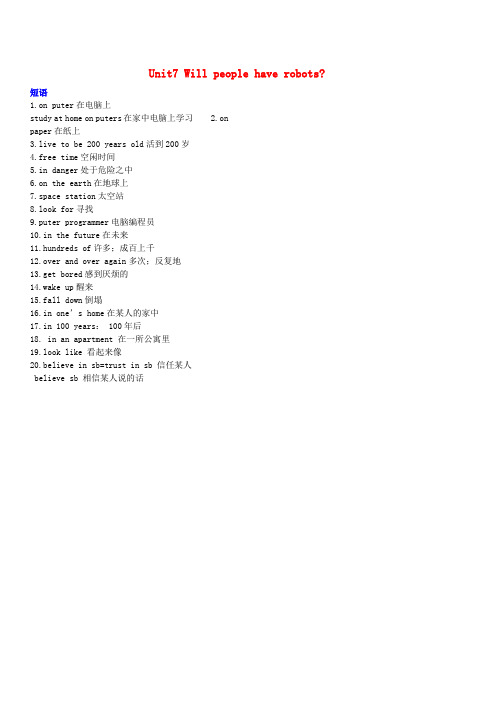
Unit7 Will people have robots?短语1.on puter在电脑上study at home on puters在家中电脑上学习 2.onpaper在纸上3.live to be 200 years old活到200岁4.free time空闲时间5.in danger处于危险之中6.on the earth在地球上7.space station太空站8.look for寻找9.puter programmer电脑编程员10.in the future在未来11.hundreds of许多;成百上千12.over and over again多次;反复地13.get bored感到厌烦的14.wake up醒来15.fall down倒塌16.in one’s home在某人的家中17.in 100 years: 100年后18. in an apartment 在一所公寓里19.look like 看起来像20.believe in sb=trust in sb 信任某人believe sb 相信某人说的话用法:1.will+动词原形将要做……2.fewer/more+可数名词复数更少/更多……less/more+不可数名词更少/更多……3.have to do sth.不得不做某事(客观) must 必须(主观)5.There will be + 主语+其他将会有……6.There is/are +sb./sth.+doing sth.有……正在做某事7.make sb. do sth. 8.help sb. with sth.帮助某人做某事9.What will the future be like ? 未来将会是什么样子?10.Which side do you agree with ?你同意哪一方的观点?。
八年级英语上册 Unit 7 Will people have robots?教案2
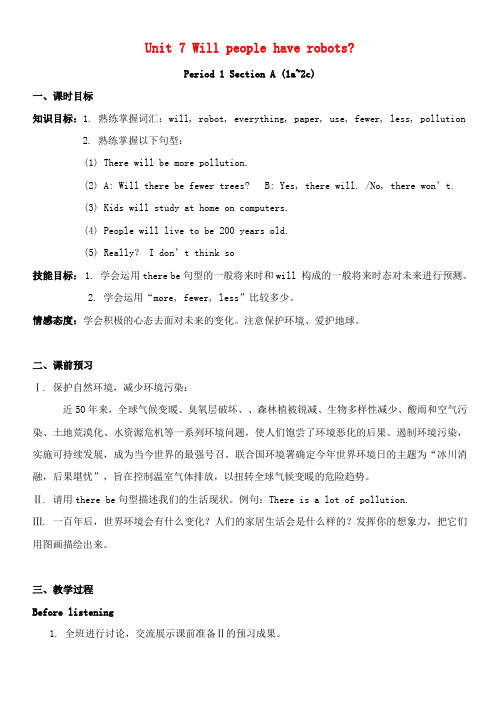
Unit 7 Will people have robots?Period 1 Section A (1a~2c)一、课时目标知识目标:1. 熟练掌握词汇:will, robot, everything, paper, use, fewer, less, pollution2. 熟练掌握以下句型:(1) There will be more pollution.(2) A: Will there be fewer trees? B: Yes, there will. /No, there w on’t.(3) Kids will study at home on computers.(4) People will live to be 200 years old.(5) Really?I don’t think so技能目标:1. 学会运用there be句型的一般将来时和will 构成的一般将来时态对未来进行预测。
2. 学会运用“more, fewer, less”比较多少。
情感态度:学会积极的心态去面对未来的变化。
注意保护环境、爱护地球。
二、课前预习Ⅰ. 保护自然环境,减少环境污染:近50年来,全球气候变暖、臭氧层破坏、、森林植被锐减、生物多样性减少、酸雨和空气污染、土地荒漠化、水资源危机等一系列环境问题,使人们饱尝了环境恶化的后果。
遏制环境污染,实施可持续发展,成为当今世界的最强号召。
联合国环境署确定今年世界环境日的主题为“冰川消融,后果堪忧”,旨在控制温室气体排放,以扭转全球气候变暖的危险趋势。
Ⅱ. 请用there be句型描述我们的生活现状。
例句:There is a lot of pollution.Ⅲ. 一百年后,世界环境会有什么变化?人们的家居生活会是什么样的?发挥你的想象力,把它们用图画描绘出来。
三、教学过程Before listening1. 全班进行讨论,交流展示课前准备Ⅱ的预习成果。
八年级英语上册 Unit 7 Will people have robots Period 7教案 (新版)人教新目标版
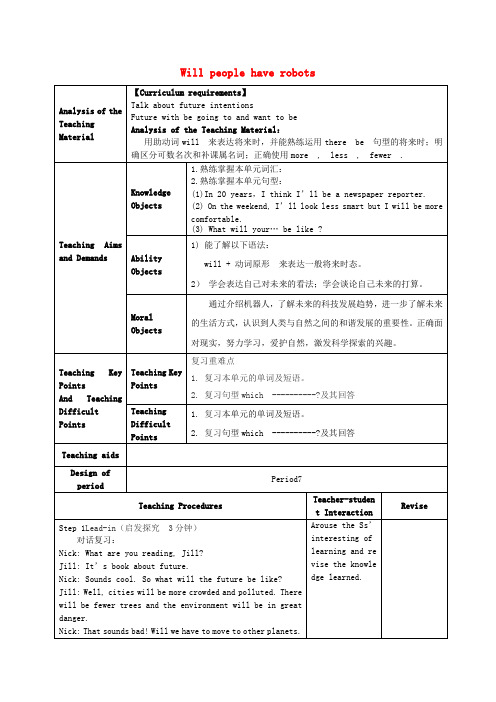
It seems/seemed that 看起来好像…, 似乎…. He was very happy.
seem to be + 形容词/名词 = seem + 形容词/名词。 She seems to be happy.= She seems happy.
Step 2 Self-studying(自主探究 6分钟)
用法:
will + 动词原形 将要做
fewer/more + 可数名词复数 更少/更多…
less/more + 不可数名词 更少/更多
try to do sth. 尽力做某事
have to do sth 不得不做某事
agree with sb. 同意某人的意见
Teaching Procedures
Teacher-studentInteraction
Revise
Step1Lead-in(启发探究 3分钟)
对话复习:
Nick: What are you reading, Jill?
Jill: It’s book about future.
Nick: Sounds cool. So what will the future be like?
such + 名词(词组) 如此
play a part in doing sth 参与做某事
make sb do sth 让某人做某事
help sb with sth 帮助某人做某事
There will be + 主语+ 其他 将会有….
初中英语人教版八年级上册《Unit7 Will people have robots Section

3c
Complete the chart and discuss it with your partner.
A: What do you want to be when you grow up? B: I want to be a reporter. A: How are you going to do that? B: I’m going to write articles and send them to
可数名词 1. more +
不可数名词
2. less + 不可数名词
3. fewer + 可数名词
more songs 更多的歌曲
more juice 更多的果汁
less news 更少的消息
fewer actors 更少的演员
People will have less free time.
人们将会有更少的闲暇时间。
1) be going to 表示近期、眼下就要产生的事情, will 表示的将来时间则较远一些。 He is going to write a letter tonight. He will write a book one day.
2) be going to 表示根据主观判定将来肯定产生的 事情,will表示客观上将来势必产生的事情。 He is seriously ill. He is going to die. He will be twenty years old.
tomorrow?
A.does; like
B.is; liking
C.will; like
D.will; be like
4. Don't ___A_____ water, or we will have no clean water
人教版八年级英语上册 Unit 7 Will people have robots(第3课时)教案
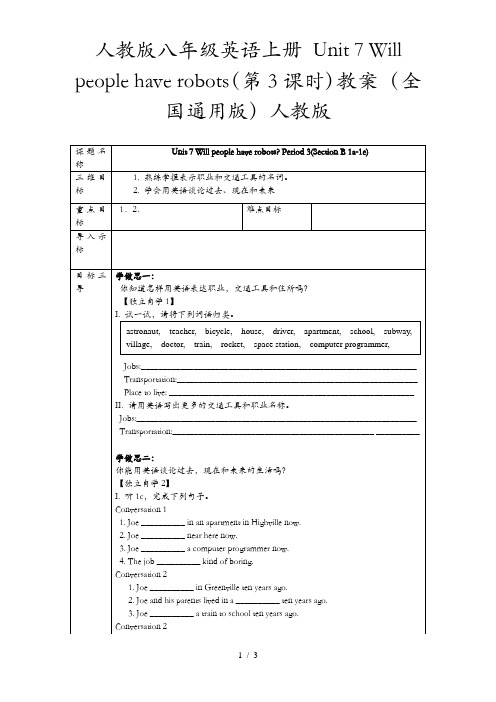
2.我们要坐火箭飞到月球。
We __________ _________ rockets _________ the moon.
3.他的叔叔是一名宇航员。他去年在太空站工作。
His uncleis an _________. He worked on a _________ _________ last year.
2. Joe and his parents lived in a __________ ten years ago.
3. Joe __________ a train to school ten years ago.
Conversation 2
1. Joe __________ an astronaut in ten years.
2. Joe __________ near here now.
3. Joe __________ a computer programmer now.
4. The job __________ kind of boring.
Conversation 2
1. Joe __________ inGreenvilleten years ago.
3. After three days he went to the mountains.(改为将来时态)
_________ three days he is _________ to the mountains.
4. They will finish their workin 2 hours. (对划线部分提问)
__________ __________ will they finish their work?
人教版英语八年级上册Unit7《Will people have robots_》知识点
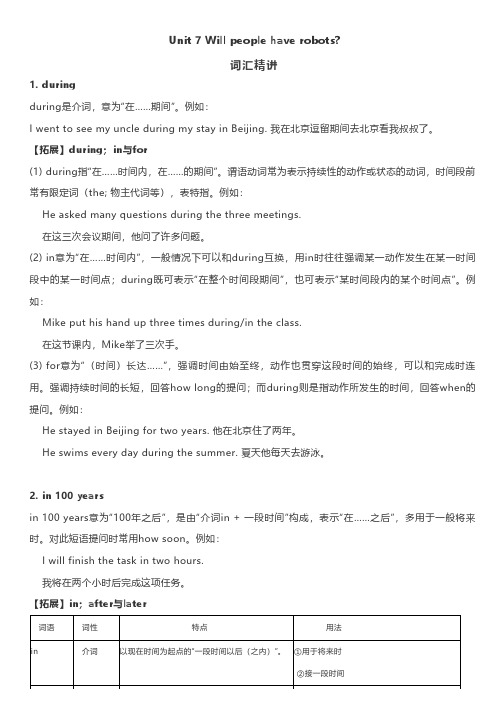
Unit 7 Will people have robots?词汇精讲1. duringduring是介词,意为“在……期间”。
例如:I went to see my uncle during my stay in Beijing. 我在北京逗留期间去北京看我叔叔了。
【拓展】during;in与for(1) during指“在……时间内,在……的期间”。
谓语动词常为表示持续性的动作或状态的动词,时间段前常有限定词(the; 物主代词等),表特指。
例如:He asked many questions during the three meetings.在这三次会议期间,他问了许多问题。
(2) in意为“在……时间内”,一般情况下可以和during互换,用in时往往强调某一动作发生在某一时间段中的某一时间点;during既可表示“在整个时间段期间”,也可表示“某时间段内的某个时间点”。
例如:Mike put his hand up three times during/in the class.在这节课内,Mike举了三次手。
(3) for意为“(时间)长达……”,强调时间由始至终,动作也贯穿这段时间的始终,可以和完成时连用。
强调持续时间的长短,回答how long的提问;而during则是指动作所发生的时间,回答when的提问。
例如:He stayed in Beijing for two years. 他在北京住了两年。
He swims every day during the summer. 夏天他每天去游泳。
2. in 100 yearsin 100 years意为“100年之后”,是由“介词in + 一段时间”构成,表示“在……之后”,多用于一般将来时。
对此短语提问时常用how soon。
例如:I will finish the task in two hours.我将在两个小时后完成这项任务。
人教新目标版英语八上Unit7《Willpeoplehaverobot》(Period5)说课稿

人教新目标版英语八上Unit 7《Will people have robot》(Period 5)说课稿一. 教材分析人教新目标版英语八上Unit 7《Will people have robot》(Period 5)是一篇关于未来科技发展对人类生活影响的话题。
本节课主要围绕未来社会机器人与人类的互动,探讨了机器人在日常生活中的应用以及可能带来的挑战。
教材通过丰富的情景设置和任务型活动,引导学生学会用一般将来时谈论未来,提高学生的预测能力和创新思维。
二. 学情分析八年级的学生已经掌握了基本的英语语法知识,具备一定的听说读写能力。
他们对未来科技发展充满好奇,具有较强的求知欲和创新精神。
但同时,部分学生对英语学习中存在恐惧心理,缺乏自信心,且在未来题材的理解上存在一定的困难。
三. 说教学目标1.知识目标:学生能够掌握一般将来时的基本结构,运用一般将来时谈论未来。
2.能力目标:学生能够通过听力、阅读和交流,提高对未来科技的预测和创新思维能力。
3.情感目标:学生能够树立正确的科技观,认识到科技发展对人类生活的影响,激发学生热爱科学、探索未知的热情。
四. 说教学重难点1.重点:学生能够运用一般将来时谈论未来,掌握一般将来时的基本结构。
2.难点:学生能够在未来题材的语境中准确运用一般将来时,表达自己的观点和预测。
五. 说教学方法与手段1.教学方法:采用任务型教学法,通过听力、阅读、讨论、汇报等环节,引导学生主动探究、积极参与。
2.教学手段:利用多媒体课件、网络资源、图片等辅助教学,提高学生的学习兴趣和参与度。
六. 说教学过程1.导入:以一张有趣的机器人图片引发学生对未来的想象,激发学生的学习兴趣。
2.听力活动:播放一段关于未来机器人的听力材料,学生听后回答相关问题,培养学生获取信息、处理信息的能力。
3.阅读理解:学生阅读一篇关于未来机器人的文章,通过回答问题、小组讨论等方式,提高学生的阅读理解和批判性思维能力。
八年级英语上册 Unit 7 Will people have robots Period 3教案 (新版)人教新目标版
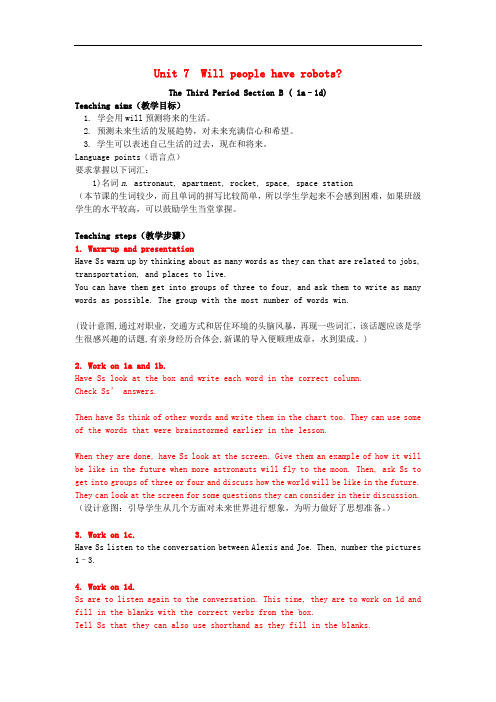
Unit 7 Will people have robots?The Third Period Section B ( 1a–1d)Teaching aims(教学目标)1. 学会用will预测将来的生活。
2. 预测未来生活的发展趋势,对未来充满信心和希望。
3. 学生可以表述自己生活的过去,现在和将来。
Language points(语言点)要求掌握以下词汇:1)名词n. astronaut, apartment, rocket, space, space station(本节课的生词较少,而且单词的拼写比较简单,所以学生学起来不会感到困难,如果班级学生的水平较高,可以鼓励学生当堂掌握。
Teaching steps(教学步骤)1. Warm-up and presentationHave Ss warm up by thinking about as many words as they can that are related to jobs, transportation, and places to live.You can have them get into groups of three to four, and ask them to write as many words as possible. The group with the most number of words win.(设计意图,通过对职业,交通方式和居住环境的头脑风暴,再现一些词汇,该话题应该是学生很感兴趣的话题,有亲身经历合体会,新课的导入便顺理成章,水到渠成。
)2. Work on 1a and 1b.Have Ss look at the box and write each word in the correct column.Check Ss’ answers.Then have Ss think of other words and write them in the chart too. They can use some of the words that were brainstormed earlier in the lesson.When they are done, have Ss look at the screen. Give them an example of how it will be like in the future when more astronauts will fly to the moon. Then, ask Ss to get into groups of three or four and discuss how the world will be like in the future. They can look at the screen for some questions they can consider in their discussion. (设计意图:引导学生从几个方面对未来世界进行想象,为听力做好了思想准备。
八年级英语上册 Unit 7 Will people have robots Period 7教案 (新版)人教新目标版

He is going to write a letter tonight.
He will write a book one day.
2. be going to表示根据主观判断将来肯定发生的事情,will表示客观上将来势必发生的事情。
重点
教学重点:
1)学习掌握一般将来时态的意义和结构。
2)掌握There be句型的一般将来时态的结构。
难点
教学难点:
掌握more/fewer;more/less的用法。
情态动词will +动词原形来表达一般将来时态。
五、教学过程设计
be going to与will的区别
be going to与will两者都可表示将要发生的事、将要去做某事,但它们有如下几点区别:
Unit 7 Will people have robots
一、教材分析
will +动词原形来表达一般将来时态。学会表达自己对未来的看法;学会谈论自己未来的打算。
二、学情分析
1.八年级处于思维活跃期,对学习本单元有好处,可以进一步开阔学生视野。
3.本单元总体知识结构比较单一,内容相对比较简单。
三、教学目标
(3) be in great danger(4) on the earth
(5) less water(6) playa part
七、作业设计
Recite the conversation in 2d after school.
4.在有条件从句的主句中,一般不用be going to,而多用will,如:
If any beasts comes at you, I'll stay with you and help you.
八年级英语上册Unit7WillpeoplehaverobotsPeriod4教案(新版)人教新目标版

Unit 7 Will people have robots?The Fourth Period Section B ( 2a–2e)Teaching aims(教学目标)1.让学生熟悉未来机器人的话题并以此展开阅读活动。
2. 培养学生通过略读判断段落大意以获得对文章的整体理解的能力。
3.通过文章阅读提高scanning/skimming阅读策略能力。
要求掌握以下词汇:1) 名词n. human, servant, factory, shape, side2) 形容词adj. dangerous, possible3) 副词adv. even, insideTeaching steps(教学步骤)1. Predicting – work on 2a.Show Ss the pictures of some robots and what they can do on the screen.Have Ss get into pairs and tell their partner what they know about robots now. What do they look like and what can they do?Then ask each pair to draw a picture about how they think robots will look like in the future.(设计意图:通过预测,培养学生的预测能力,同时也让学生对机器人的形状和作用有一个比较直观的初步了解,调动学生对阅读材料的期待感。
)2. Work on 2b.SkimmingHave Ss look at the article on page 53 and read it. Then, ask them to match each paragraph with the question it discusses.(设计意图:通过快速阅读寻找文章的段落大意。
初中英语人教版八年级上册《Unit7 Will people have robots Section

Section B (2a-2e)
人教新目标版 八年级上
1
What you know about robots? What do they look like and what can they do?
What does the robot look like? shape
do the same things as we do
look like humans
walk, dance difficult, think like a human
more robots
different shapes
2c 1. Robots can build __c_a_rsin factories. 2. They can do __s_im__p_l_e jobs many times and
can. For example, he thinks that robots will ________be able to wake
upneavnedrknow where they are. Which side do you________ with? agree
1. human 人
【辨析】 human,person与people
human
Human servants.
They can do simple jobs over and over again.
Guess! What can snake robots do?
If buildings _f_a_ll_d_o_w__n with people _i_n_s_id_e, these snake robots can help ___lo__o_k_f_orpeople under the buildings.
人教版英语八 年级上册Unit 7 Will people have robots Section

Unit7 Will people have robots?SectionB 1a-1e教师寄语:Where there is a will, there is a way. 有志者事竟成。
一、Learning aims (学习目标):1、Students can read the four wordsastronaut 、apartment 、 rocket 、 space station2 、Students can make predictions using “will”3、Students learn to talk about their past 、now and future学习重点:Students make discussion about their past 、now and future 学习难点:writing practice using the target language二、学法指导:Cooperating三、Studying steps:Step1.Enjoy a song—I have a dreamStep2.Brainstorm (Let’s compete!)How many dream jobs and transportation and places to live do you know? Make a listDream jobs:Transportation:Places to live:Step3.Present picturesStep4.Do 1aStep5.PairworkA:What will you be when you grow up?B:I’ll be a(an)......A:How will you go to work?B:I’ll go......A:Where will you live?B:I’ll live......Step6.Listening practiceFirst,(1c) Listen to Alexis and Joe. Number the pictures [1-3].Next,(1d) Listen again. Fill in the blanks with the correct verbs in the box.Step7.Talk ShowNow interview(采访) everyone’s life now,five years ago and five years from now in your groups.Name Now five years ago In five yearsInterviewer(采访者):......A:......B: ......C: ......... ... ...Step8. WritingAccording to the above results. I think you can do some writing,then report like this:In my group, Zhang Wei was a...and he played soccer and he had ...five years ago.But now he is a...四、Self—check(自我检测)单项选择1.In ten years, John_______ an astronaut.A. isB. will beC. wasD. will2.Mary_______computer science last year.A. studiedB. studiesC. will study3. What_______the world be like in 50 years?A. isB. willC. wasD. are五、Blackboard Design1、key wordsAstronaut rocket apartment space station2、key pointsPlayed ---- play --- will play六、Homework想像一下20年之前的郑州、看看现在的郑州,再设想一下20年之后的郑州,然后小组讨论并写一篇80字左右的文章。
八年级英语上册《Unit7Willpeoplehaverobots》的知识点归纳
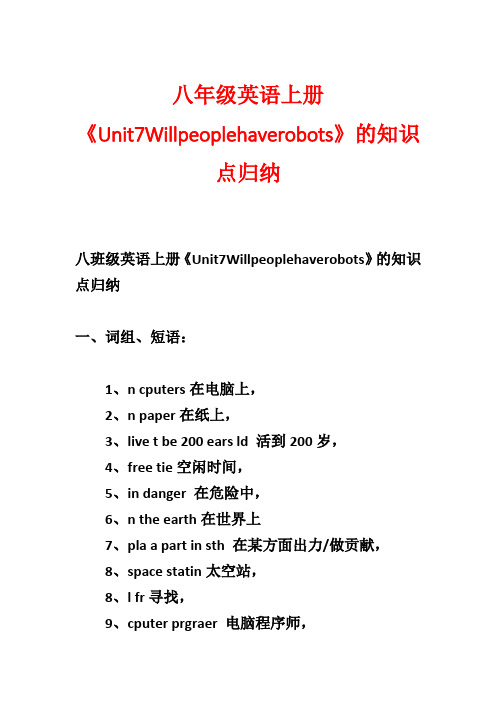
八年级英语上册《Unit7Willpeoplehaverobots》的知识点归纳八班级英语上册《Unit7Willpeoplehaverobots》的知识点归纳一、词组、短语:1、n cputers在电脑上,2、n paper在纸上,3、live t be 200 ears ld 活到200岁,4、free tie空闲时间,5、in danger 在危险中,6、n the earth在世界上7、pla a part in sth 在某方面出力/做贡献,8、space statin太空站,8、l fr寻找,9、cputer prgraer 电脑程序师,10、in the future 在将来,11、hundreds f成百上千的.,12、the sae…as与…一样,13、ver and ver again 反复,14、get bred 无聊,abe/perhaps 用于句首。
Mabe/Perhaps u are right.1. during / fr / in 介词,在……期间。
说到某事是在某一段时间之间发生的用during; 说到某事持续多久则用fr; 说到某事具体发生的时间用in.We visited an places f interest during the suer hlida.I’ve been here fr tw we es.The usuall leave schl in ul.一般将来时结构:肯定式:主语+ will/shall + 动词原形+ 其他will 用于各种人称,shall 用于第一人称。
主语+ be ging t + 动词原形+ 其他be 随人称、数和时间的变化而变换。
否定式:在will/shall/be 后面加nt. will nt = wn’t .一般疑问句:将will/shall/be 提到主语前面。
There be 句型的一般将来时:There will be + 主语+ 其他,意为:将会有。
八年级英语上册 Unit 7 Will people have robots Period 4教案 (新版)人教新目标版1
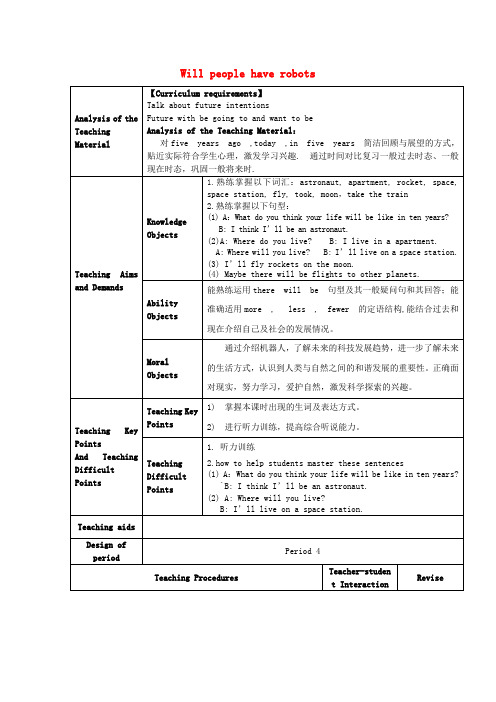
Will people have robotsStep I Step 1 Lead-in(启发探究 3分钟)I.收集有关职业和交通工具的名词。
Job:____________________________________________ Transportation:______________ ________________Ⅱ. 根据自己的实际情况完成下列表格。
How did you get to school five years ago?How do you get to school now?Where did you live five years ago?Where do you live now?What will your life be like in ten years?(职业)Step 2 Self-studying(自主探究 6分钟)Before listening1.朗读la单词,理解其汉意,并按照职业、交通工具、居住地点进行分类,完成表格。
2.Groupwork:除了1a中列举的这些词汇,你还掌握哪些类似词汇?结合课前准备Ⅰ的内容,进行小组讨论。
比一比哪一组收集得最多。
While listening1. 听录音,完成课本1c任务。
2.速读1d句,理解其汉意。
再听一遍录音,完成课本1d任务。
3. 听第三遍录音,选择正确的句子完成下面的对话。
Conversation 2Alexis: So, did you live here in Tec Ville ten years ago? Joe: No, I lived with my parents inGreenville.___________________________.I went to school here in Tec Ville, though. Alexis: Really? That’s pretty far from here. How did you get to school?Joe: Oh, I t hink I’ll be an astronaut.Alexis: An astronaut? Are you kidding?Joe: No, I’m serious. __________. Maybe there will be flights to other planets.Alexis: Oh, and where will you live? Joe: ______________1. Oh, I took the train to school.2. I’ll fly rockets to the moon.3. We lived in a house in the country.4. I’ll live on a space station.5. What do you think your life will be like in ten years?4. 模仿秀:听录音并跟读,注意模仿你所听到的问句的语音语调。
八年级英语上册Unit7Willpeoplehaverobotsperiod2教案人教新目标版

Unit7Will people have robots ?Teaching goals:1. Words&phrases: robot, paper, less, fewer, simple, unpleasant, factory, seem, etc .2。
will 构成的一般将来时态的陈述句、否定句、疑问句及回答.3。
There be 句型的一般将来时.4。
more , less , fewer 的用法.5. 学习一般将来时态的相关知识,学会对未来进行预测.6。
对five years ago ,today ,in five years 简洁回顾与展望的方式,贴近实际符合学生心理,激发学习兴趣。
7。
通过时间对比复习一般过去时态、一般现在时态,巩固一般将来时.Important and difficult points :1。
will构成一般将来时态的句式。
2. There be 句型的一般将来时态。
3. more , fewer , less 的用法。
4。
How to make predictions .Period 1Teaching procedures:Step 1 Leading in1. Greetings: Welcome to school 。
What’s the date today ? Who’s on duty today ?Do you enjoy your winter holiday ?Do you finish your homework ?Do you want to live on the moon ?Can you guess what will happen in ten years ?Collect t he Ss’ answers and say something about their predictions .Step 2 Pre-taskSB Page 2 ,1a .1。
- 1、下载文档前请自行甄别文档内容的完整性,平台不提供额外的编辑、内容补充、找答案等附加服务。
- 2、"仅部分预览"的文档,不可在线预览部分如存在完整性等问题,可反馈申请退款(可完整预览的文档不适用该条件!)。
- 3、如文档侵犯您的权益,请联系客服反馈,我们会尽快为您处理(人工客服工作时间:9:00-18:30)。
1.正确的理解和运用本课的重点词汇。
2.准确理解重点词汇在文中的实际意义。
3.培养学生正确的阅读方法和技巧。
教学难点
1.准确理解重点词汇在文中的实际意义。2.通过阅读概况出文章每段的大意。
教学过程设计
Step 1 Greetings
Step 2 .Revision .Finish some exercises.
Unit 7 Will people have robots
教
学
目
标
知识
技能
1.正确的朗读并会运用本课的新词汇及重点短语:research , adult, remaining, or so, endangered, artwork, wild, government,run over, walk into, fall over, die from, ;
1.Sts scan the article and finish the tasks in 2b and2c.
2.Have the sts share answers.
Step 5.second reading
I.ss read the article and guess the bule words .
Step3.presentation.
1.show a picture of panda,have the ss talk about the panda with the words in the box.
2.Have sts share their results.
Step 4. First reading
2.Do some exercises.
Step 8:come to 2d and 2e.
Sts read the text again and finish the exercises in 2d and 2e.
Step9:summary.
Ss read and remember the use phrases.
Step 10 .Homework
1.Read the text aloud and remember the useful phrases.
2.Finish the exercises on the newspaper.
2.通过对课文的四次递进式阅读,理解课文的大意。了解熊猫濒临灭绝的原因及我们如何保护大熊猫。
过程
方法
通过自主学习和小组合作学习,进一步培养学生阅读理解能力,掌握阅读的基本技巧和方法。
情感
态度
Students learn more about panda and try our best to protect them.
2.Check the answers. Tell the ss how to find out the main ideas of each paragraph
Step 7.The fourth reading
1.ss read the text and discuss the important language points. The teacher explains them if it’s necessary.
2.do some exercises to consolidate the important words .
Step 6.The third reading
1.ss read the article again and find out the main ideas of each paragraph.
